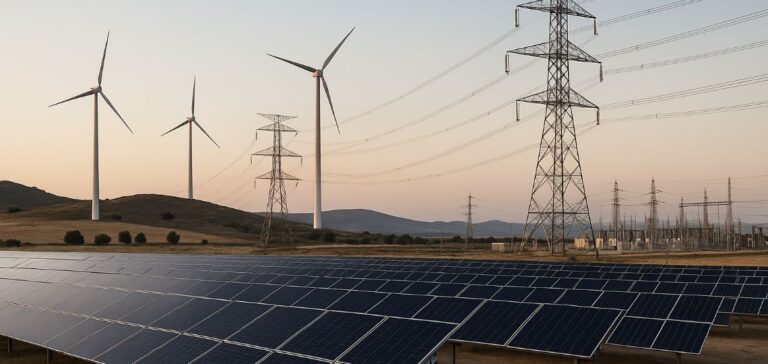A massive power outage on Monday plunged large parts of Spain and Portugal into darkness, placing renewed scrutiny on the country’s energy model. While Spain’s electricity grid operator, Red Eléctrica de España (REE), continues its investigations, the increasing share of wind and solar power in the national supply is being blamed by several political and economic stakeholders.
Renewables under scrutiny
In 2024, solar and wind energy accounted for nearly 40% of Spain’s electricity mix, according to REE. This marks a sharp rise from 2014 and is now twice the share of nuclear energy, which fell to 20% last year. The shift reflects government policy under Prime Minister Pedro Sánchez, which includes a plan to phase out all nuclear plants within ten years.
Criticism surfaced quickly after the incident, particularly in the pages of ABC and El Mundo, which attributed the network’s fragility to an unbalanced energy mix. Sector experts interviewed after the blackout pointed to difficulties in balancing supply and demand without adequate storage capacity or stabilisation technologies.
Warnings flagged before the incident
In its annual report published in February, REE’s parent company, Redeia, had already warned of “high penetration of renewable production without the technical capabilities necessary for appropriate behaviour during disturbances.” The Spanish competition regulator, Comisión Nacional de los Mercados y la Competencia (CNMC), also noted in January that the transmission network faced “stress levels close to authorised limits.”
During the blackout, the equivalent of 15 gigawatts – or 60% of Spain’s electricity demand – dropped off the grid in five seconds, according to REE. Two separate incidents, spaced one and a half seconds apart, one possibly involving a solar installation in the country’s southwest, were identified as potential triggers of the collapse.
Authorities urge caution
REE President Beatriz Corredor defended the grid’s stability on Wednesday, stating that renewable energy production is “safe” and that the February report only outlined theoretical risks. “Linking Monday’s serious incident to renewable penetration is not accurate,” she told Cadena Ser.
Minister for the Ecological Transition Sara Aagesen also warned against speculation, saying no firm conclusion could yet be drawn. She added that the system had previously operated under similar demand and mix conditions without major disruptions, describing the Spanish grid as “robust.”
Judicial inquiry underway
A judicial investigation has been launched to assess whether a cyberattack may have caused the blackout. However, REE said on Tuesday that it found “no intrusions” in its monitoring systems. The Spanish government labelled the event “unprecedented” due to the speed at which the grid destabilised.
As the full findings of the investigation are awaited, debates continue across Spain’s political and industrial circles regarding the security of a grid dominated by renewable energy sources.






















